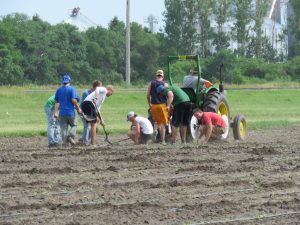
One of our big projects this summer was funded by Genome Canada, and involved us having a dryland trial and a flood trial out near Oakes, ND. In order to set up the flood trial, we had to manually lay irrigation drip tape (totaling about 9 miles!) to simulate the flood environment. Below is a brief summary of the research project:
Plants are regularly challenged by a variety of environmental stresses such as drought, flooding, salt, and low-nutrient levels. These stresses negatively affect plant growth and reduce the productivity of our crops. Though wild plants have evolved mechanisms to meet these challenges, many crops are less resilient. To reduce stress-induced yield loss and improve food security, attention has increasingly turned to the development of stress-resistant crops. However, these efforts require an improved understanding of the mechanisms allowing plants to resist these stresses. Such knowledge will enable the development of crops capable of growing in previously unsuitable habitat and thus feed a rapidly growing population in the context of an increasingly variable climate, particularly as marginal farmlands are brought into production. We propose to investigate the molecular and physiological basis of drought, flooding, salt, and low-nutrient stress resistance in cultivated sunflower and reproductively compatible, stress-adapted wild species that are potential donors of beneficial resistance traits. Sunflower is an ideal system for the proposed research because this $20 billion oilseed crop is clearly limited by such stresses, while wild relative species are adapted to a variety of extreme environments.
Ultimately, the proposed research would achieve several objectives: (1) identify and fully characterize the genetic basis of stress resistance traits in sunflower; (2) create germplasm resources that would enable sunflower breeders to put stress-resistant, high-yield cultivars in the field within four years of project end; (3) develop crop yield models to predict likely yields of the new stress resistant sunflower cultivars in different soil and climate conditions across Canada; and (4) develop strategies for reducing barriers to R&D caused by international treaties.
Expanded sunflower production made possible by the new cultivars is expected to yield ~$12 million USD annually within five years of the project end date and up to ~$230 million USD annually after ten years. Stress-resistant cultivars will stabilize production in the face of environmental stresses in Sub-Saharan Africa, reducing the potential for famine. Worldwide impacts will be substantial, as no other oilseed can maintain stable yields across as wide a range of environmental conditions as can improved sunflower cultivars.
